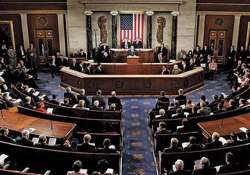Washington, Dec 13: Reflecting a bipartisan toughening of stand against Pakistan, leaders of a US House-Senate negotiating panel have agreed to freeze USD 700 million in aid to Islamabad, a move that could put more strain on the troubled ties between the two countries.
In a statement issued late last night, negotiating panel of the House of Representatives and the Senate unanimously agreed to freeze the USD 700 million aid to Pakistan pending Pentagon's delivery of a strategy for improving the effectiveness of such assistance and assurances that Pakistan is countering Improvised Explosive Devices networks in their country that are targeting collation forces.
The House Armed Services Committee said the National Defense Authorization Act (NDAA) for the Fiscal Year 2012 also reached a compromise on USD 662 billion Defense Authorization Bill for the year 2012.
Besides stringing aid to Pakistan, the military spending bill also targets Iran's Central Bank and sets new hurdles for closing Guantanamo Bay prison for al-Qaeda fighters. The legislation will now face vote in both the Houses this week amid warnings by President Barack Obama that he would veto any bill that required military custody of suspected extremists who target US.
Pakistan is one of the largest recipients of US foreign aid, and the freeze, when it is empowered by the Congress, would form only a small portion of billions of dollars of civil and military assistance it gets each year. But the freeze could lead to greater cutbacks as demands rise in the US to penalise Islamabad for failing to act against militant groups on its soil, who kill US soldiers in Afghanistan.
Locally made IEDs are the most effective weapons used by terrorists against US and NATO forces in Afghanistan.
“This freeze includes the majority of the USD 1.1 billion in Pakistan Counterinsurgency Fund,” the House Armed Services Committee said in a statement, after the members of the House of Representatives and the Senate reached an agreement on the Annual Defense Bill.
The bill, which sets policy and spending priorities for the Pentagon, is generally considered must-pass legislation. The Defense Authorization Bill 2012 “limits the amount of funds available for the Pakistan Counterinsurgency Fund (PCF) until the Secretary of Defence provides Congress a strategy on the use of the PCF and on enhancing Pakistan's efforts to counter the threat of IEDs,” said the Senate Armed Services Committee in another separate statement.
The US wants “assurances that Pakistan is countering IEDs in their country that are targeting our coalition forces,” House Armed Services Chairman Buck McKeon told reporters. “We have had some shaky relations lately with Pakistan.
We need them, they need us,” he said.
The new military spending would authorise USD 662 billion for military personnel, weapon systems, national security in the Energy Department and the wars in Iraq and Afghanistan, reflecting a winding down of decade-old conflicts. The bill provides USD 27 billion less than Obama requested and USD 43 billion less than Congress gave the Pentagon a year ago.
Senate Armed Services Committee Chief Carl Levin commenting on moves on Iran said, “They are going to pay a bigger and bigger price should they continue towards nuclear weapons.”
Latest World News
